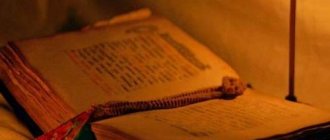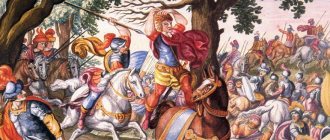Psalm 57 has a common theme with the previous one and is its logical continuation. It also tells of the time when David, the future king of Judah, was persecuted by Saul. The then ruler lost the favor of the Lord, but did not want to put up with it. He tried in every possible way to harm God’s chosen one, who was now the young but modest David.
About the author About the book
Text of prayer Psalm 57
In Church Slavonic
In the end, do not corrupt David in the pillar 1 If you truly speak the truth, judge rightly, sons of humanity. 2 For you do iniquity in your hearts; in the land your hands twist iniquity. 3 The sinner has alienated herself from falsehoods, having gone astray from the womb, she has spoken a lie. 4 Their wrath is in the likeness of a serpent, like a deaf asp that stops its ears, 5 Whoever does not hear the voice of those who are won over is wondrous by wisdom. 6 God will break their teeth in their mouth; the Lord has broken the limbs of lions. 7 They will be humbled like flowing water; they will strain their bow until they faint. 8 As if the wax melted, they were taken away, and fire fell on them, and they did not see the sun. 9 Know first that your thorns are alive, for they will devour you in wrath. 10 The righteous will rejoice when he sees vengeance; he will wash his hands in the blood of the sinner. 11 And the man said, If there be fruit for the righteous, there is a God who judges them on the earth.
In Russian
For execution. Don't destroy it. David, for the inscription on the pillar. 1 If truly you speak the truth, judge righteously, O sons of men. 2 For you do iniquity in your heart; in the earth your hands twist iniquity. 3 Sinners have departed from their mother’s womb, they have gone astray from the womb, they have spoken lies. 4 Their fury is in the likeness of a serpent, like a deaf asp that stops its ears, 5 which does not obey the voice of those who exorcise, nor the potion prepared by the wise. 6 God will break their teeth in their mouths; the Lord has broken the jaws of lions. 7 They will disappear like running water; He will bend His bow until they fail. 8 They were destroyed like molten wax; the fire fell on them, and they did not see the sun. 9 Before your thorns become entwined into thorns, He will swallow them up alive in His wrath. 10 The righteous will rejoice when he sees vengeance; he will wash his hands in the blood of the sinner. 11 And the man will say: “If indeed there is fruit for the righteous, then there is a God who judges them on earth.”
The first part of Psalm 57 is about enemies
Verses 2 through 6 are about denouncing the persecutors. David was not yet a king at that time, so here he appears as a prophet speaking under the inspiration of God. Psalm 57 shares the same mood with the previous and subsequent chapters. This is not just a prayer, but a deep analysis of human souls. The people who were entrusted with power have not lived up to the trust of the Lord, and many accusations are made against them.
- Vicious government. Citizens have the right to expect a balanced decision from the powers that be. The judges who were given power knew the laws very well, and they were very fair. But the people called upon to maintain order followed the ruler’s lead.
What made them do this? They were afraid of losing the high positions through which they had gained influence and wealth. Therefore, ordinary citizens could not count on objectivity, because the court was corrupt.
Prophets have always spoken on behalf of the Creator. And David reminds us that no mortal will remain on earth forever. Sooner or later, everyone faces the end, after which - a meeting with the Supreme Judge. He will demand an account, and everyone who was offended by an unrighteous person will be there to expose him before the incorruptible Creator.
- Supporting unjust rule. The psalmist sees a special sin in the fact that the actions of evil people are not at all random. They are well thought out, dictated by certain aspirations.
The government that should protect the innocent, the oppressed, instead makes them even more miserable. The determination to do evil gradually crowds out all other aspirations in the heart.
History of writing
King David was anointed king by the Lord for his righteous life and humility. King Saul was a cruel and domineering man, and the Lord’s mercy to David aroused envy in him. It was this sin that pushed Saul to commit terrible acts - he began to pursue David in order to kill him.
In persecution and fear, David did not give up hope for reconciliation. But Saul betrayed and deceived the young man more than once, so there was no doubt that only David’s death would calm the king. Despair and fear of death accompanied David; at that terrible time, he wrote the text of Psalm 57, in which he put his pain and hope for the help of the Lord.
Interpretation of the Psalter
Expressions from the Old Testament may not always be immediately clear to modern people. For example, in Psalm 57 there is a rather harsh phrase about how the righteous will wash his feet in the blood of the wicked. Interpreters explain that this is only a figurative expression.
- In ancient times, there was a lot of blood of the fallen on the battlefield, so often the feet of warriors were stained with it. Indeed, in those days, Israel was very often attacked, many wanted to conquer its fertile lands. That is why such a comparison was clear to his contemporaries.
In line 3, the author accuses his judges of the fact that their plans were full of deceit from the very beginning. They didn’t even intend to arrange a fair analysis of the situation, they just wanted to veil the murder out of personal hostility.
- Here we can draw a parallel with the judgment that will be carried out on Jesus in the future. Many parts of the Old Testament writings prophetically point to the coming of the Savior and the circumstances of His mission. The sentence of the Son of God was also passed unfairly, under pressure. Although the Jewish people are the chosen ones who keep the Law, they did not recognize Christ as the deliverer spoken of in the Bible.
Envy of the innocent Teacher ruled their hearts, which forced them to put pressure on those in power and deceive the common people. They went to any lengths in order to accuse Jesus of an offense against customs, to convict Him of disrespect for customs, so that He would no longer disturb their established life.
Interpretation of David's Psalm 57
Every verse of Psalm 57 is imbued with despair and hope for salvation. During the time of David, endless wars made the people angry, life was hard, and people were cruel, this affected everything. The text of David's Psalm 57 may seem too angry to some, but it describes the feelings that false accusations, slander and insults aroused in the king.
The interpretation of Psalm 57 makes it clear that sinners will never go unpunished, but their judgment is in the hands of the Lord.
- Verse 1-3 - description of David's enemies and their atrocities: slander and false accusations;
- Verse 4-5 - here conspirators and slanderers are compared to snakes, disobedient to God's will;
- Verse 6-9 – David prays to the Lord for help and intercession in the hope that he will punish and crush them;
- Verse 10-11 - rejoicing about the miraculous salvation and praising the Lord, the protector of the righteous.
How to Recognize Sinners
Many believers are concerned about the issue of predestination. Can everyone count on salvation, or are there people who are destined to burn in hell? The prophet says that some are cut off from God's grace from birth. Wicked parents pass on the worst qualities to their children. As soon as they learn to talk, they begin to blaspheme the Lord. The older they get, the more they learn to sin. Such sinners are easy to recognize:
About the author About the book
- They learn to deceive early. The tongue of a sinner easily speaks lies. Even as children, they make excuses or attribute non-existent virtues to themselves in order to receive praise. It is wicked words that are the greatest sin.
- Evil heart. Sinners are compared to a serpent. The poison symbolizes their anger, disgust for everything that the righteous do. Just as a snake cannot stop producing poison, so the wicked, who belong to the seed of the serpent, are unable to cleanse themselves of sinfulness.
- Reluctance to submit to God. Humility today is perceived by many not as a virtue, but as a weakness. In fact, this is the first sign of a sinner who has become entrenched in his vices. Just as a snake is unable to hear by nature, so the evil descendants of Satan cannot hear God’s call in their hearts.
Everyone has a tendency to do bad things - this is original sin. To save your soul, you must obey the Lord, act according to your conscience, or your soul will quickly harden.
- Psalm 118 in Russian;
- See here Psalm 67 - text in Russian, interpretation, why they read it;
- Psalm 50 - read in Russian, which helps: https://bogolub.info/psalom-50/.
Reading rules
It is recommended to attend a church service where Psalm 57 is read, but you can also sing a song to the Lord at home. It is better to perform the sacrament of prayer in front of icons. If in church the clergy use the Old Church Slavonic language, then at home you can read Psalm 57 in Russian. Sinners will always be punished for their atrocities, but the court is in the hands of the Lord; you should not beg for revenge because of a petty quarrel, and, moreover, you yourself should slander an innocent, albeit unlovable person.
( 1 ratings, average: 5.00 out of 5)
Why, when and how to read
The psalms are read in Church Slavonic and Russian. You can communicate with God both in church and at home. The text is spoken almost in a whisper. Emotions and experiences are unnecessary.
Words should come from the heart, not the head. It is then that the prayer will be heard by the Lord God.
If Psalm 56 is read for good luck in business, then the next song is pronounced during a period of difficult trials and mental anguish. The person praying asks for the help, protection and patronage of the Almighty.
You can read a prayer appeal not only in difficult life situations, but also during various undertakings in business and business. Prayer drives away gossipers and envious people who can interfere with success.
In his speeches, David asks for protection and help
You can read the Psalter in Church Slavonic and Russian languages
At home they pray in silence and solitude
Psalm 57 - why they read it
Each chapter of the Psalter is a complete work that has its own inscription (something like an introduction). Psalm 57 also begins with it - we see the words “to the end.” What does this mean? To clarify, we should start with what psalms are in general. These are songs meant to glorify the Lord. They were performed mainly to the accompaniment of musical instruments.
- In Russian translation, the inscription reads “to the choir conductor.” This is the meaning of the expression “to the end.” The conductor had to set the text to music, learn it together with the musicians, and direct the performance.
- Then there is the inscription “let us not corrupt” - that is, “do not destroy.” This reflects the overall theme of the psalm, in which the author asks the Lord to protect him and his people from harm.
- Also in the introductory part there is an indication of authorship. It, as already said, is attributed to King David, this is a historical figure. During his reign he accomplished many glorious deeds. But before that he had to endure unjust persecution.
So, the lines were written during the persecution by Saul. David was forced to wander for years, finding shelter either in wild caves or with former enemies. This was probably very inconvenient, because nomadic life is unsettled.
- The second verse talks about judgment. Some students of the Holy Scriptures think that this is not just a literary image, but a real historical event. The trial was initiated by Saul to make personal hatred of David a public matter.
- For this farce, the king assembled a council of elders. To please the ruler, David was recognized as an outlaw. In this case, the verdict was pronounced in absentia, without the presence of the accused. He was given the status of a “wolf”; absolutely any resident of the country could calmly kill David. Anyone who decided to defend him also became a criminal.
- The author denounces his enemies, describing in all colors their sins before the Lord. He himself now acts as an accuser, promising them quick death. After all, the fugitive is confident in his righteousness, therefore he relies on higher justice. The Lord is a righteous judge; all sinners can confidently rely on him.
Many people wonder why they read this text - it is recommended to recite it during testing periods
It doesn’t matter what they are caused by: circumstances, the machinations of your enemies or your own mistakes. These lines will help express confusion, hope for protection from above
Text of Psalm 5 in Russian
1 To the director of the choir. On wind instruments. Psalm of David.
2 Hear, O Lord, my words, understand my thoughts.
3 Hear the voice of my cry, my King and my God! for I pray to You.
4 Lord! early hear my voice, early I will appear before You and wait,
5 For You are a God who does not love iniquity; The evil one will not dwell with You;
6 The wicked will not abide in Your sight: You hate all the workers of iniquity.
7 You will destroy those who speak lies; The Lord abhors the bloodthirsty and treacherous.
8 And I, according to the abundance of Your mercy, will enter Your house, I will worship Your holy temple in Your fear.
9 Lord! guide me in Your righteousness, for the sake of my enemies; level your path before me.
10 For there is no truth in their mouth: their heart is destruction, their throat is an open grave, they flatter with their tongue.
11 Condemn them, O God, that they may fall by their own devices; Because of the multitude of their wickedness, cast them away, for they have rebelled against You.
12 And all those who trust in You will rejoice, they will rejoice forever, and You will protect them; and those who love Your name will boast in You.
13 For you bless the righteous, O Lord; You crown him with favor like a shield.
The Psalms are read under different life circumstances, because all human successes are the grace of God. By reading the psalter you can pray for the living and the dead, ask for physical and mental health.
If you find an error, please select a piece of text and press Ctrl+Enter.






